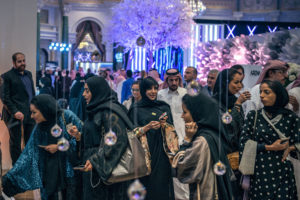Special to WorldTribune.com
A recent report from the kingdom indicates that dropping hostility to Israel is part of the Saudi regime’s far-reaching reform plans. Israel should respond.
In the Sept. 14 issue of POLITICO magazine, retired U.S. diplomat Zalmay Khalilzad published a report on his most recent trip to Saudi Arabia and the startling, indeed astonishing, changes he found there.

Khalilzad is wholly credible witness. He has spent a great deal of time in the Middle East, including Saudi Arabia, Jordan and the Gulf States. He was ambassador to Iraq and Afghanistan, as well as the United Nations. Among many others, he met with the King, the crown prince, the deputy crown prince and various ministers on this trip.
His report makes the following points:
- The Saudis are now willing to admit that the regime has supported Arab extremism in the past and only when the Jihadi movements turned on them did they change their policies in this regard.
- The Saudi regime has jettisoned ideology for modernization. It is seen as essential in the new environment of low oil prices and growing threats from extremist groups and Iran.
- Adoption of an ambitious program of social reforms, including the purging of extremists from government positions, appointment of new religious leaders to counter Islamist extremism, new curbs on the powers of the religious police and transformation of the Muslim League through appointment of a new leader and the cessation of support for Islamist madrassas abroad.
- On the economic front there are detailed plans to transform the country from a natural resource-dependent to a knowledge economy, shrinking the bureaucracy, reducing subsidies, removing red tape, promoting the domestic private sector and promoting foreign investment. To which I might add expansion of the role of women in higher education and in the work force.
- And what of Israel? “The Saudis stated with unusual directness that they do not regard Israel as an enemy…. They did emphasize the need for progress on the Palestinian issue, but the tone on this subject was noticeably less emotional than in the past.”
I suppose it goes without saying that recognition of Israel by Saudi Arabia and some of the Gulf states, especially Kuwait and the UAE, would be a huge diplomatic and strategic coup for Israel. Every effort should be made to find out, and if feasible, implement whatever measures with reference to the West Bank would trigger such a development.
Some possibilities might include enhanced autonomy, perhaps negotiated with a new leadership in Ramallah. Clearly the possibility of that is what caused Abbas to cancel the municipal elections, but it is not clear how much longer Israel, Egypt, Jordan, Saudi Arabia and the Gulf states will put up with his obstructionism.
I foresee fundamental changes in the near future leading to a common front against the terrorist groups rampaging through the Middle East and against Iran.
Norman A. Bailey, Ph.D., is Adjunct Professor of Economic Statecraft at The Institute of World Politics, Washington, D.C., and a researcher at the Center for National Security Studies, University of Haifa. He was formerly with the U.S. National Security Council and the Office of the Director of National Intelligence.
